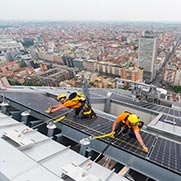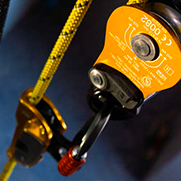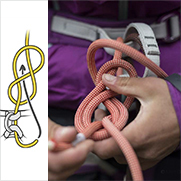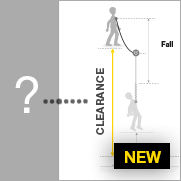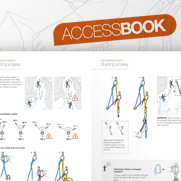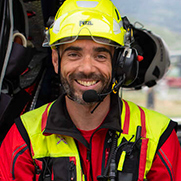Cake recipes, water buckets, and sandstone cracks
The "Trainer Kollektiv" won the German national qualifiers for the Petzl RopeTrip and will be the official German team to participate in the final event in Salt Lake City at the beginning of April. We asked Birte, Nils, and Sven what the event, rope access profession, and sport climbing represent for them, and how they plan to prepare for the Petzl RopeTrip.
March 17 2016
Rope access and confined space
Congratulations on your victory in the German qualifiers for the Petzl RopeTrip! Did this at all awaken the competitor inside and the hope to place in the final event in Salt Lake City?
Birte: Of course we'd like to succeed in Salt Lake City, but we're not training like crazy either. Our main goal is to enjoy ourselves.
Sven: The international level is a step up from the national qualifiers. The 2012 event in Crolles was an eye opener for us. I went with two friends and colleagues without any training or preparation beforehand, which resulted in a mediocre performance. That said, we really enjoyed the experience - it was by far the best weekend of the year for me. Salt Lake City will likely be much different, but the most important thing is to have a good time.
We heard that you have been training specifically for the challenges you might face in Salt Lake City. What exactly are you doing to train?
Nils: We are working on our endurance as well as our ability to concentrate during the individual events. We start by completing a fairly long rope ascent before performing, with the utmost efficiency, a system change. Of course, the much-beloved water bucket is clipped to our harnesses. In addition, we're reviewing and training specific rescue techniques and three-dimensional rigging for heavy objects.
Sven: It's difficult to do targeted training since we don't know exactly what type of challenges we'll face. We have watched past editions and have tried to imagine the possibilities. What is interesting with this type of event is that you have to split the individual challenges among the team based on the strengths and weaknesses of each member.
Why don't you tell the other teams what your weaknesses are?
Birte: My mom's homemade cake! If we let our guard down at lunch time we risk revealing to our adversaries all of the scrumptious details of our best cheese cake recipes.
All of you sport climb outside the office. Is working as a rope access professional more than just a job? If yes, why?
Birte: For pure rope access work itself, no, but for actual rope access techniques, yes. There are so many incredible opportunities to take on new practical and theoretical challenges. Having to think hard and solve problems is really fulfilling.
Sven: Yes, Birte, that's exactly how I see things, which makes this more than just a job. If rope access work was just a way to earn a living we wouldn't spend so much time on the challenges, problems, and the possibilities that rope access techniques offer.
What does sport climbing mean to you?
Nils: To always be able to take on new challenges and to feel the calm tranquility of the great outdoors. Being active outdoors is one of those simple pleasures in life, and isn't that enough.
Birte: For me, climbing is synonymous with peacefulness, freedom, and enjoyment. I'll admit that climbing, especially cragging, represents a personal challenge for me to overcome my fears.
Sven: Climbing was really important during a certain period in my life – but my responsibility to my family and to my longtime teammate, who runs his own company, has forced me to shift my priorities. I hope that my son will one day want to go climbing with his dad.
Would you say that your more sports-oriented approach was one of the reasons for your victory at the German qualifiers?
Birte: I think that we owe our victory to our performance as a team. I am also convinced that each of our mindsets is to always look for the most efficient solution to a problem, whether when training rope access professionals, sport climbing, or working in an office.
Who will stay in the United States after the event?
Nils: Birte and I.
What are your upcoming projects?
Nils: To visit a few climbing areas in Utah, there's lots to explore. I am really curious to see sandstone cracks up close.
Birte: I'm a bit afraid of cracks, but hopefully that will change ;-)
Nils: Snowboarding and paragliding are also part of the program, and then we'll just see when we get there what other interesting things there are to do.
Birte: Rest and relax after the challenge and from our daily routine.
What are you hoping to get out of the Petzl RopeTrip in Salt Lake City?
Birte: To really have fun. I enjoy meeting other people who are as passionate about rope access techniques as my two teammates. In addition, international events like this are always great opportunities to exchange ideas with others, to see different techniques, to talk about them with others and to even try them out.
Which is more important, the challenge or the symposium??
Nils: We'll see ;-)
Sven: To be honest, the most important is the challenge. But I'm also happy to be able to participate in the other associated events.
How was Trainer Kollektiv Rope & Rescue created?
Nils: Two experienced climbers met and decided that they could do better than what was offered in most training programs in terms of teaching methods, presentation technique, and course content.
What is the goal of Trainer Kollektiv, what are your specialties?
Nils: Our specialty is training rope access specialists of all types. Course content ranges from using fall-arrest personal protective equipment to rope access techniques, to FISAT standards for work positioning and much more.
Thank you for the interview!
Birte's profile
Age: 31
Place of residence: Hamburg, Germany
Profession: Rigger
Training/rope access qualifications: FISAT L3; IRATA L1, SRHT team leader
In the profession since: 2007
How did you end up at Trainer Kollektiv and in this job?
My first forays into climbing were in 2004/2005 during my training to become a rigger. At the time, I had started sport climbing with colleagues to take my mind off my rather monotonous job. This gave me, while in the entertainment profession, access to the rigging and climbing worlds. In order to develop solid skills and to be able to earn a little money during my sports studies, I went through rope access certification in 2007.
After practicing rope access and work positioning as a profession, I had the opportunity, thanks to a colleague, to share my knowledge and experience with future rope access professionals.
Teaching has become a passion for me. I think that it is linked to the fact that to pass along knowledge to another person, you have to continuously develop your ability to be aware of every aspect of what you're doing.
What is important to me is to give others the chance to take the best training course possible. To do this, I think that you have to constantly reassess and reevaluate yourself, as well as be willing to take on new challenges. What also interests me is teaching in a way that goes far beyond simply passing an exam or complying with specific standards.
Thanks to the FISAT technical seminar, I met Nils Henneken in 2004 and I understood that he was also consumed by this passion. In 2015, we turned an idea into reality by creating the Trainer Kollektiv.
Did you work in another profession before working in rope access?
Yes and no. When I worked in events, the risk of falling from high up was already part of my daily routine doing rope access and setup work. Today, my focus is more on the safety aspect and training/qualifications.
What do you really like about the work that you do?
The fact there's a new challenge every day. It's like climbing a new route. I have considerable knowledge, skills, and technique, but the people that I meet are always different and require me to completely focus on the new task at hand.
What do you want to do when you grow up?
To take over the world every day like Pinky ;-)
Nils' profile
Age: 38
Place of residence: Berlin
Profession: Industrial mechanic
Training/rope access qualifications: FISAT, FISAT L3; IRATA L1, SRHT team leader, climbing coach
In the profession since: 2004
How did you end up at Trainer Kollektiv and in this job?
During my studies in Berlin, I was looking for a way to earn money and my friends suggested that I take a rope access training course. Since it fit with my passion for climbing, this once odd job turned into a profession for me.
Over the last few years, I have increasingly focused on teaching rope access and related courses. After spending a few years as an instructor and managing a training company, I started looking for colleagues who thought the same way I did about the need for the profession to evolve. In 2014, during a FISAT technical seminar, I met Birte Kahlbrock and I saw that she also cared a great deal about the topic. The Trainer Kollective was born.
Did you work in another profession before working in rope access?
I did different things. After my coursework as an industrial mechanic, I earned my high school diploma. Following my civil service, where I took care of severely handicapped individuals, I started university coursework in energy and process engineering, which I then stopped in order to focus on rope access work.
What do you really like about the work that you do?
Day in and day out, I like having to be creative with the rope techniques I use, a prerequisite to being able to work safely and efficiently.
When teaching, it's the varied experience and learning style from one individual to the next that really motivates me. The one-size-fits-all approach rarely if ever works; you always have to take each individual into consideration to enable them to successfully learn the content and the logic of the system.
Sven's profile
Age: 42
Place of residence: Berlin
Profession: hotel manager, work safety technician
Training/rope access qualifications: FISAT L3; FISAT certifier
In the profession since: 1998
How did you end up at Trainer Kollektiv and in this job?
Strictly speaking, I'm only a "volunteer instructor," so I don't actually work for the Trainer Kollectiv. I stopped my independent consulting business three years ago and at the moment when we were looking for a name it seem only natural for the team to opt for the Birte and Nils' company name. The FISAT technical seminar in 2014 was not only where Trainer Kollektiv was born, but also the event where I more or less convinced Birte to participate in the competition. Until then I barely knew her, whereas Nils and I had already known each other for 6 years through working as FISAT certifiers.
Did you work in another profession before working in rope access?
After working for a few years in the hotel business, I was a sailor for five years and between two tours at sea I worked in rope access. Like Nils, I learned about the rope access profession through climbing. In the 1990s, it was still fairly unstructured.
What do you really like about the work that you do?
I've had a permanent position at FISAT for the last three years; I manage an office where I spend most of my time. It's nice to see that I still have the ability to ascend a rope. Over the last three years, I've learned something new every day, and I think that's the best motivation one can have in a job.
What do you want to do when you grow up?
Honestly? For the moment I can't think of anything else I'd rather be doing.
Related News


